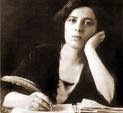"I woke the next morning with three things in my head- a pair of swollen eyes, a heavy pain, and a fixed determination to write a book."
This line is from Miles Franklin's 1899 novel, My Brilliant Career (discussed previously), which goes on to describe the young 'Authoress', Sybilla Melvyn, scribbling at her book in the dark of the night; hiding it from a conservative family who little understands her need to create.
A similarly ambitious 'scribbler' is Jo March in Louisa May Alcott's Little Women series, first published in 1868, about thirty-two years before the gutsy Franklin put pen to page.
Jo March is one of the saving graces of Alcott's somewhat preachy series of novels about the March family. A deeply flawed and thus profoundly human character, Jo is strong minded and fiercely independent. She struggles with herself as much as with the restrictions of outside world.
The passage below (one of my favourite parts of this novel) gives us a portrait of Jo the writer:
Every few weeks [Jo] would shut herself up in her room, put on her scribbling suit, and `fall into a vortex', as she expressed it, writing away at her novel with all her heart and soul, for till that was finished she could find no peace. Her `scribbling suit' consisted of a black woollen pinafore on which she could wipe her pen at will, and a cap of the same material, adorned with a cheerful red bow, into which she bundled her hair when the decks were cleared for action. This cap was a beacon to the inquiring eyes of her family, who during these periods kept their distance, merely popping in their heads semi-occasionally to ask, with interest, "Does genius burn, Jo?" They did not always venture even to ask this question, but took an observation of the cap, and judged accordingly. If this expressive article of dress was drawn low upon the forehead, it was a sign that hard work was going on, in exciting moments it was pushed rakishly askew, and when despair seized the author it was plucked wholly off, and cast upon the floor. At such times the intruder silently withdrew, and not until the red bow was seen gaily erect upon the gifted brow, did anyone dare address Jo.
(from chapter IV of Good Wives, Part Two of Little Women)
These paragraphs clearly show the euphoria brought on by writing. I've been reading a bit of Alice Walker lately, and I'm almost tempted to use a phrase like 'ecstatic creation' to describe Jo's writing process.
Jo declares a space for herself in which she can be an artist and then assertively defends it from her family. Her unusual clothing signifies the internal changes she undergoes as she writes, letting the Marches know that, temporarily at least, she is no longer the dutiful daughter of the house.
Like a mad professor in her 'rakish' cap, she grumpily rejects the mundane realm, taking to a private space to perform mysterious acts of creation. Escaping the endless domestic clatter, she claims, in Virginia Woolf's timeless words, "a room of one's own".

Considering the era's ambivalent attitudes to literary women, Jo's family seems unusually supportive of her artistic inclinations. Perhaps, though, they see Jo's writing not as a serious pursuit, but as an extension of her eccentricity and tom-boyishness. An obsessively scribbling daughter is something of a 'cross' for the saintly Marches to bear.
This attitude is also indicated by how, earlier in the series, Jo's writing takes place in a garret. Garrets are spaces of marginality, traditionally inhabited by dusty old furniture and bric-a-brac, not to mention the odd ghost, or mad wife. Jo's literary career is therefore pushed to the outer fringe of the household, perhaps symbolic of its perceived 'oddness' by the March family.
A vague anxiety about Jo's writing also exists in Alcott's likening it to a 'fit' or 'attack'. Jo enters an almost feverish state where she declines all nourishment, provoking worry from her mother and relief once the 'attack' has passed. Victorian novels often depict heroines falling ill of 'brain fever' after excessive mental strain. I can't imagine Alcott believing such twaddle, of-course, but I do have to wonder if this idea crept in unawares.
These quibbles, are, however, small and do not stack up against evidence that, by and large, Jo's family genuinely encourages her literary career. So much so, in fact, that it makes me wish Sybilla Melvyn could have gone back in time about thirty years, emigrated to America, and moved in with the Marches. She probably would have had to undertake more bible-study than anyone should ever have to, but on the up-side, I'm sure Jo would have given her a corner of the writer's garret for her very own...




